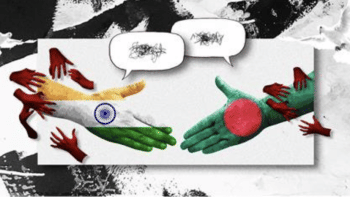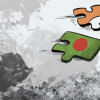A wake-up call for India’s strategic interests

The political upheaval in Bangladesh on August 5, 2024 marked a turning point in the nation's history. A massive student-led uprising, backed by a wide spectrum of the population, toppled Sheikh Hasina's long-standing authoritarian regime. This movement culminated in the formation of an interim government led by Nobel Laureate Prof Muhammad Yunus. The uprising was a response to years of frustration under Sheikh Hasina's administration, characterised by corruption, institutional decay, and the suppression of dissent.
During Sheikh Hasina's tenure, her policies often favoured India, granting it substantial economic and strategic benefits—at the expense of Bangladesh's own interests. Critics likened this dynamic to quasi-colonialism. In return, Hasina relied on India's support to maintain her grip on power, despite growing domestic opposition.
Despite Sheikh Hasina's total trust in India's support to safeguard her regime, she had to face the reality that India ultimately declined even to dispatch an aircraft for her rescue. This turn of events highlighted the pitfalls of over-reliance on foreign powers rather than cultivating domestic legitimacy.
Her removal was seen as a strategic blow by India. Faced with an unfamiliar political landscape in Dhaka, Indian policymakers seemed uncertain about their next steps.
Following Hasina's ouster, a section of the Indian media delved into a widespread disinformation campaign, alleging that massive atrocities were being carried out against Hindus and other minorities in Bangladesh. Claims of killings, rape, and attacks on Hindu temples were circulated to depict as though Bangladesh was spiralling into chaos and extremism. However, most of these allegations were entirely unfounded.
For example, ABP Ananda, a subsidiary of West Bengal's Anandabazar Patrika, aired a video showing police brutality against students on August 5, but it was misleadingly presented as evidence of Hindu oppression. Similarly, a video claimed to be circulated by RT India showed attacks on Hindu temples in Bangladesh. However, verification revealed that the footage actually depicted a religious festival in West Bengal, India.
Despite the interim government's urging to extradite her, India continues to allow Sheikh Hasina—an alleged violator of human rights with an active arrest warrant issued by a competent court—to disseminate propaganda and incite civil unrest in Bangladesh. By openly facilitating activities intended to demonise the interim government, India is disregarding international norms, undermining peace and security, and fuelling hostility.
Such misinformation campaigns not only distort reality but also risk inflaming communal tensions. The Indian media has even featured commentary advocating military intervention in Bangladesh under the guise of "protecting minorities" or securing strategic interests. Speculative suggestions include occupying areas like Chattogram or regions near the Siliguri Corridor.
Despite the provocative nature of these claims, the Indian authorities have taken no action to discourage such rhetoric, raising questions about their adherence to international norms. However, India recently clarified that the government was not responsible for the activities of the media outlets that have been spreading disinformation.
Domestically, India's ruling Bharatiya Janata Party (BJP) appears to be leveraging these narratives to strengthen Hindu nationalist sentiment in their favour. Opposition parties, including the Indian National Congress and Trinamool Congress, have echoed similar rhetoric to appeal to the Hindu majority electorate. This tactic may temporarily unify the Hindu vote but risks long-term damage to India's regional relationships.
On an international level, if India continues to view misinformation as a strategic tool to retain influence on Bangladesh by undermining the credibility of its interim government, it will be counterintuitive. This strategy overlooks a critical reality: the more pressure India applies, the more the people of Bangladesh, including its minority communities, unify against its interference. It reflects the same miscalculation India made by exclusively supporting the Sheikh Hasina regime, disregarding the will of the Bangladeshi people.
Bangladesh is not just a neighbour but a vital trading and security partner whose stability directly affects India's northeastern states. Escalating tensions could destabilise the region, harm economic ties, and push Bangladesh closer to other global powers eager to fill the vacuum left by India's waning influence. India's dominant posture in South Asia has already strained its relationships with Pakistan, Sri Lanka, and Nepal among others. A similar trajectory with Bangladesh risks further isolation, undermining India's long-term strategic objectives.
The recent visit by Indian Foreign Secretary Vikram Misri to Dhaka—four months after the interim government took office—provides some room for optimism, however. The Indian foreign secretary said they wanted to "carry on from where we left off" and that they "have to do business with the government of the day." Indeed, constructive engagement, based on mutual respect and shared goals, would benefit both nations. A stable and prosperous Bangladesh is critical for regional security and economic interdependence.
Hence, India should focus on fostering trust and rebuilding ties. By respecting Bangladesh's sovereignty and prioritising dialogue, India can strengthen its position as a reliable partner, safeguarding its interests in South Asia. To realise its aspirations for superpower status, India must prioritise cooperation, respect for sovereignty, and genuine partnership; only then can it secure its place as a stable and respected leader in the region.
Saifur Rahman is a senior IT specialist and certified professional, Australian Computer Society.
Views expressed in this article are the author's own.
We welcome your contributions and analysis of global events, and responses to our articles. To submit articles to Geopolitical Insights, please send an email to [email protected].
Follow The Daily Star Opinion on Facebook for the latest opinions, commentaries and analyses by experts and professionals. To contribute your article or letter to The Daily Star Opinion, see our guidelines for submission.

 For all latest news, follow The Daily Star's Google News channel.
For all latest news, follow The Daily Star's Google News channel. 












Comments